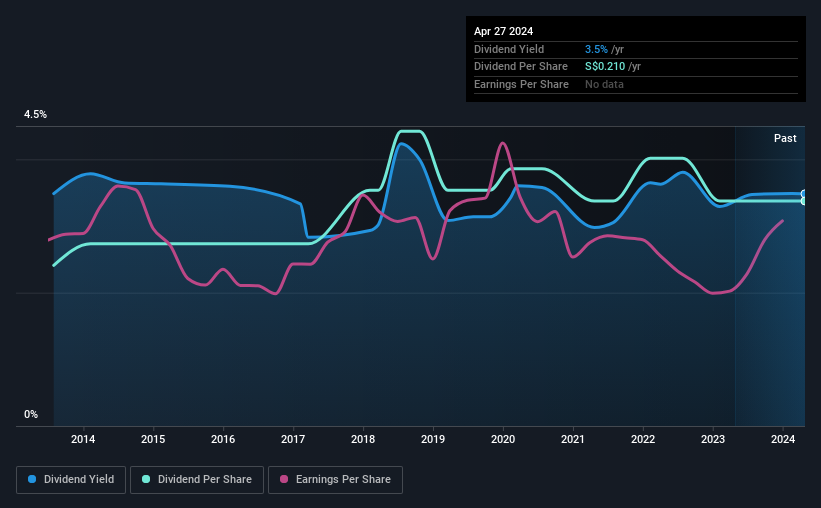Why You Might Be Interested In United Overseas Insurance Limited (SGX:U13) For Its Upcoming Dividend
Some investors rely on dividends for growing their wealth, and if you're one of those dividend sleuths, you might be intrigued to know that United Overseas Insurance Limited (SGX:U13) is about to go ex-dividend in just 3 days. The ex-dividend date is usually set to be one business day before the record date which is the cut-off date on which you must be present on the company's books as a shareholder in order to receive the dividend. The ex-dividend date is an important date to be aware of as any purchase of the stock made on or after this date might mean a late settlement that doesn't show on the record date. This means that investors who purchase United Overseas Insurance's shares on or after the 2nd of May will not receive the dividend, which will be paid on the 15th of May.
The company's next dividend payment will be S$0.125 per share, and in the last 12 months, the company paid a total of S$0.21 per share. Based on the last year's worth of payments, United Overseas Insurance stock has a trailing yield of around 3.5% on the current share price of S$6.03. Dividends are a major contributor to investment returns for long term holders, but only if the dividend continues to be paid. As a result, readers should always check whether United Overseas Insurance has been able to grow its dividends, or if the dividend might be cut.
See our latest analysis for United Overseas Insurance
If a company pays out more in dividends than it earned, then the dividend might become unsustainable - hardly an ideal situation. Fortunately United Overseas Insurance's payout ratio is modest, at just 36% of profit.
Companies that pay out less in dividends than they earn in profits generally have more sustainable dividends. The lower the payout ratio, the more wiggle room the business has before it could be forced to cut the dividend.
Click here to see how much of its profit United Overseas Insurance paid out over the last 12 months.
Have Earnings And Dividends Been Growing?
Stocks in companies that generate sustainable earnings growth often make the best dividend prospects, as it is easier to lift the dividend when earnings are rising. If earnings decline and the company is forced to cut its dividend, investors could watch the value of their investment go up in smoke. With that in mind, we're encouraged by the steady growth at United Overseas Insurance, with earnings per share up 4.2% on average over the last five years.
The main way most investors will assess a company's dividend prospects is by checking the historical rate of dividend growth. Since the start of our data, 10 years ago, United Overseas Insurance has lifted its dividend by approximately 3.4% a year on average. We're glad to see dividends rising alongside earnings over a number of years, which may be a sign the company intends to share the growth with shareholders.
To Sum It Up
Has United Overseas Insurance got what it takes to maintain its dividend payments? It has been growing its earnings per share somewhat in recent years, although it reinvests more than half its earnings in the business, which could suggest there are some growth projects that have not yet reached fruition. United Overseas Insurance ticks a lot of boxes for us from a dividend perspective, and we think these characteristics should mark the company as deserving of further attention.
In light of that, while United Overseas Insurance has an appealing dividend, it's worth knowing the risks involved with this stock. Every company has risks, and we've spotted 2 warning signs for United Overseas Insurance (of which 1 is a bit concerning!) you should know about.
Generally, we wouldn't recommend just buying the first dividend stock you see. Here's a curated list of interesting stocks that are strong dividend payers.
Have feedback on this article? Concerned about the content? Get in touch with us directly. Alternatively, email editorial-team (at) simplywallst.com.
This article by Simply Wall St is general in nature. We provide commentary based on historical data and analyst forecasts only using an unbiased methodology and our articles are not intended to be financial advice. It does not constitute a recommendation to buy or sell any stock, and does not take account of your objectives, or your financial situation. We aim to bring you long-term focused analysis driven by fundamental data. Note that our analysis may not factor in the latest price-sensitive company announcements or qualitative material. Simply Wall St has no position in any stocks mentioned.

